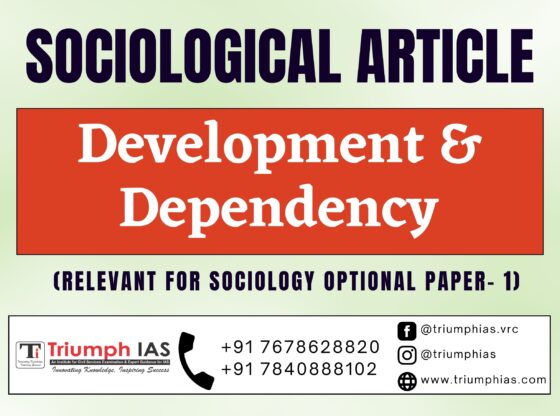Development & Dependency
Relevant for sociology optional Paper- 1 (Unit- 10 : Sociology- Social Change in Modern Society)

Development and dependency are two concepts that have gained significant attention in the field of sociology, particularly in the context of developing countries like India. Development refers to the process of economic, social, and political progress, while dependency refers to the relationship between developed and developing countries, where the latter is dependent on the former for resources, technology, and investment.
In the context of India, the concept of development has been a key policy objective since its independence from British colonial rule in 1947. The country has witnessed significant economic growth and development over the years, particularly since the economic liberalization in 1991. However, despite these achievements, India still faces several challenges in terms of poverty, inequality, and underdevelopment.
One of the main reasons for India’s slow progress in terms of development is its dependence on developed countries for resources, technology, and investment. This dependence has been perpetuated by the global economic system, which is dominated by developed countries. As a result, developing countries like India have been relegated to the periphery of the global economy, with limited access to resources and technology.
Dependency theory, which emerged in the 1960s, provides a theoretical framework for understanding the relationship between developed and developing countries. According to this theory, developed countries exploit developing countries by extracting their resources and controlling their markets. This exploitation perpetuates underdevelopment and poverty in developing countries, while benefiting developed countries.
In the context of India, this exploitation is evident in several ways. For example, developed countries like the United States and European countries have historically exploited India’s resources, particularly during the colonial period. The British Empire, which ruled India for over 200 years, extracted resources like cotton, tea, and spices, and used India as a market for its manufactured goods. This exploitation left India impoverished and underdeveloped, with a weak industrial base and a dependent economy.
Even after India’s independence, this exploitation has continued in various forms. Developed countries continue to control India’s markets through trade agreements and policies, which often favour their own industries. They also control India’s access to technology and intellectual property, which limits the country’s ability to innovate and develop new industries.
The impact of this dependency is evident in India’s economic and social indicators. Despite its economic growth, India continues to have high levels of poverty, inequality, and underdevelopment. The country ranks 131st out of 189 countries in the Human Development Index, indicating that it has a long way to go in terms of social and economic progress.
To address this challenge, India has adopted several development strategies over the years. These strategies have focused on promoting industrialization, modernizing agriculture, and investing in education and healthcare. However, these strategies have been limited by the country’s dependence on developed countries for resources and technology.
In recent years, India has taken several steps to reduce its dependence on developed countries and promote self-reliance. For example, the country has launched the “Make in India” initiative, which aims to promote domestic manufacturing and reduce dependence on imports. The government has also launched various programs to promote indigenous research and development, such as the Atal Innovation Mission and the National Supercomputing Mission.
In addition, India has been expanding its economic relations with other developing countries, particularly in Africa and Southeast Asia. This strategy, known as South-South cooperation, aims to promote economic cooperation and reduce dependence on developed countries.
Despite these efforts, India’s dependence on developed countries remains a significant challenge to its development. To overcome this challenge, the country needs to adopt a multi-pronged approach that includes promoting domestic manufacturing and research, investing in education and healthcare, and expanding economic cooperation with other developing countries.
In conclusion, development and dependency are two key concepts in the field of sociology, particularly in the context of developing countries like India. India’s dependence on developed countries has been a significant challenge to its development, perpetuating underdevelopment and poverty. To overcome this challenge, India needs to adopt a comprehensive approach that promotes self-reliance and economic cooperation with other developing countries, while investing in education and healthcare to build a strong and sustainable foundation for its future development. Only by reducing its dependency on developed countries can India achieve its full potential and become a truly developed and prosperous nation.
For more such notes, Articles, News & Views Join our Telegram Channel. https://t.me/triumphias
Click the link below to see the details about the UPSC – Civils courses offered by Triumph IAS. https://triumphias.com/pages-all-courses.php


